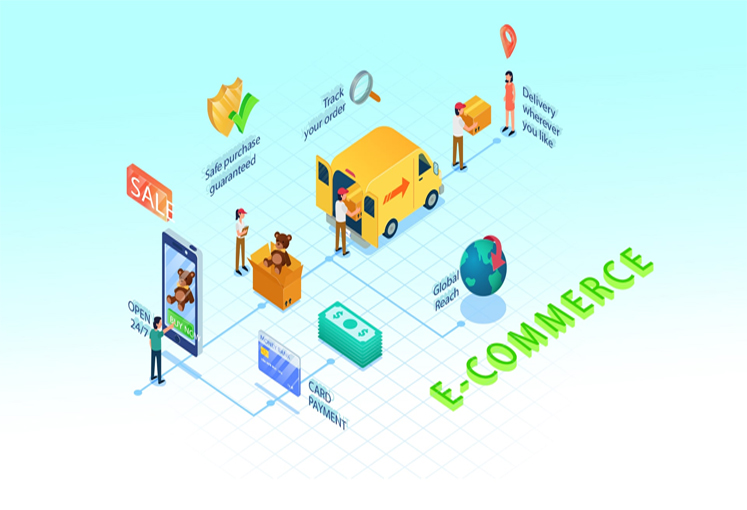In the dynamic landscape of today’s business world, understanding how ecommerce works is crucial for entrepreneurs seeking to establish a successful online presence. Ecommerce, short for electronic commerce, involves the buying and selling of goods and services over the internet. This blog aims to provide a detailed insight into the intricacies of ecommerce, covering its definition, types, essential requirements for starting an ecommerce business, a step-by-step guide, minimum investment considerations, and a SWOT analysis of the ecommerce potential in 2024.
Table of Content
What You Need to Start an Ecommerce Business?
Step-by-Step Guide to Starting an Ecommerce Business?
Minimum Investment to Start an Ecommerce Business
SWOT Analysis of Ecommerce Potential in 2024
What is Ecommerce?
Definition
Ecommerce refers to the electronic transactions of goods and services conducted over the internet. The concept has evolved significantly, encompassing various online activities such as online shopping, electronic payments, and internet banking. This evolution has revolutionized the way businesses operate and how consumers access products and services.
Types of Ecommerce
1. B2C (Business to Consumer)
B2C ecommerce involves transactions between businesses and individual consumers. Examples include online retail stores, where businesses sell products directly to end consumers.
2. B2B (Business to Business)
B2B ecommerce focuses on transactions between businesses. This includes wholesale trade, where one business sells products or services to another for resale or operational use.
3. C2C (Consumer to Consumer)
C2C ecommerce occurs when consumers sell products or services directly to other consumers. Platforms like eBay and Craigslist facilitate such transactions.
4. C2B (Consumer to Business)
C2B ecommerce involves individual consumers selling products or services to businesses. Influencer marketing and user-generated content often fall into this category.
What You Need to Start an E-commerce Business?
Preliminary Steps
1. Market Research
Before diving into the ecommerce world, entrepreneurs must conduct thorough market research. Understanding the target audience, market trends, and potential competitors is essential for making informed decisions.
2. Niche Selection
Choosing a profitable niche is critical for success. Entrepreneurs should identify areas where there is demand and assess the competition in the chosen niche.
Essential Components
1. E-commerce Platform
Selecting the right ecommerce platform is a pivotal decision. Popular platforms like Shopify and WooCommerce offer user-friendly interfaces and customizable features.
2. Domain Name and Hosting
Choosing a memorable domain name and reliable hosting service is crucial for establishing a professional online presence.
3. Payment Gateways
Integrating secure and efficient payment gateways ensures smooth transactions. Options like PayPal and Stripe offer seamless payment processing.
Legal Considerations
1. Business Registration
Registering the ecommerce business is essential for legal compliance and building trust with customers.
2. Compliance with Regulations
Understanding and adhering to regulations, such as data protection and tax laws, is vital to avoid legal complications.
Step-by-Step Guide to Starting an Ecommerce Business
1. Create a Business Plan
A well-thought-out business plan serves as a roadmap for success. It should outline the business goals, target market, revenue model, and marketing strategies.
2. Build Your Online Store
Setting up an online store involves choosing the right ecommerce platform, customizing the design, and ensuring a user-friendly experience for customers.
3. Product Listing and Descriptions
Effective product listings with compelling descriptions are essential for attracting and retaining customers. High-quality images and detailed information enhance the shopping experience.
4. Optimize for SEO
Implementing search engine optimization (SEO) practices helps improve the online visibility of the ecommerce store. Keyword research, meta tags, and high-quality content play crucial roles.
5. Implement a Marketing Strategy
Developing a comprehensive marketing strategy involves utilizing digital channels such as social media, email marketing, and search engine advertising. Consistent and targeted promotion is key to attracting customers.
6. Manage Inventory and Fulfillment
Efficient inventory management and order fulfillment are crucial for maintaining customer satisfaction. Businesses can choose between in-house fulfillment or third-party logistics services.
7. Provide Excellent Customer Service
Responsive customer support is vital for addressing customer inquiries, handling returns, and ensuring overall satisfaction. Positive customer experiences contribute to repeat business and positive reviews.
Minimum Investment to Start an Ecommerce Business?
Initial Costs
1. Ecommerce Platform Subscription
Investing in a reliable ecommerce platform is a foundational expense. Shopify and WooCommerce offer various subscription plans catering to different business sizes.
2. Website Development and Design
Budgeting for website development and design ensures a visually appealing and functional online store. This cost may vary based on the complexity of the website.
3. Marketing and Advertising
Allocating funds for initial marketing and advertising efforts is essential for promoting the ecommerce business. This may include social media ads, influencer collaborations, or search engine marketing.
Ongoing Expenses
1. Inventory Costs
Managing inventory efficiently involves ongoing expenses related to purchasing, storage, and restocking. Regular evaluation of inventory needs is crucial to avoid overstock or stockouts.
2. Operational Costs
Operational costs encompass utilities, packaging materials, and shipping expenses. Calculating and monitoring these costs ensures a sustainable and profitable business model.
SWOT Analysis of Ecommerce Potential in 2024
Strengths
Ecommerce is a growing industry that offers many opportunities for new businesses. The number of people shopping online has increased steadily over the past decade, and this trend is expected to continue.
Weaknesses
Ecommerce businesses face many challenges, including competition from established retailers and the need to build brand awareness among consumers.
Opportunities
The rise of mobile shopping has created new opportunities for ecommerce companies to reach customers on their smartphones and tablets. Similarly growing consumer preference for online shopping and Wide reach and accessibility make it one of the most rapidly expanding industry
Threats
The need to protect against cyber threats and potential data breaches. Regulatory challenges and the need to adapt as markets change.
Conclusion
In conclusion, navigating the ecommerce landscape requires a comprehensive understanding of its workings and a strategic approach to starting and managing a successful business. Entrepreneurs must focus on key aspects such as market research, niche selection, legal considerations, and effective marketing strategies. By acknowledging the minimum investment requirements and conducting a SWOT analysis of the ecommerce potential in 2024, aspiring business owners can position themselves for success in this ever-evolving industry.
Stay tuned for more in-depth insights and tips on thriving in the ecommerce realm. The journey is challenging, but with the right knowledge and strategies, the possibilities are limitless.




